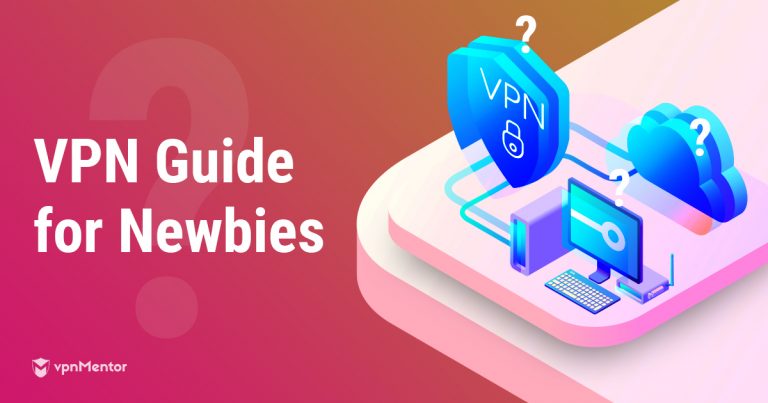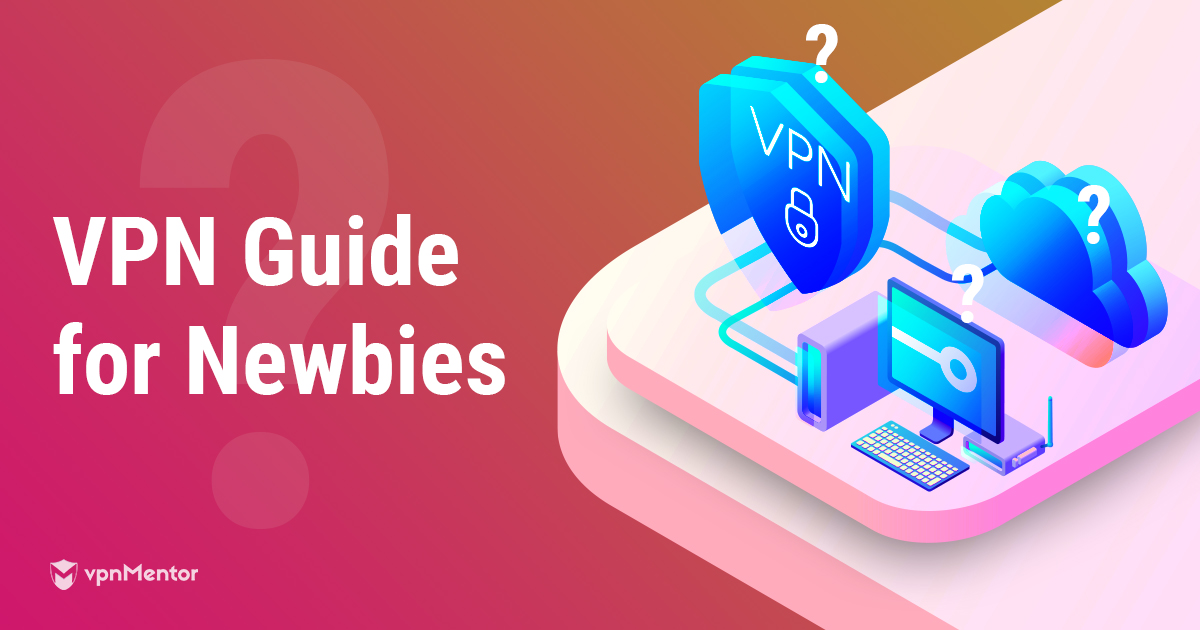
What Is a VPN and Why You (REALLY) Need One in 2023
- Why Do I Need a VPN?
- How Does a VPN Keep Me Secure?
- Are There Any Disadvantages When Using a VPN?
- Tips on Choosing the Best VPN for You
- 3 Best VPNs for Beginners in 2023
- ExpressVPN — The Overall Best VPN for Speed, Security, and Streaming
- CyberGhost — Easy-to-Use Thanks to Dedicated Streaming, Gaming, and Torrenting Servers
- Private Internet Access — Thousands of Servers Offer a Fast & Reliable Connection Around the World
- How to Get a VPN on Your Devices
- How to Set Up a VPN and Use It
- FAQs on VPNs
- Protect Your Online Privacy Today
A VPN (Virtual Private Network) is a simple app that’s purpose is to enhance your online security and privacy. VPNs send your online activity logs through one of its own private servers and encrypts it along the way. This process hides readable data that can identify you, like your location, browsing activity, and browsing patterns.
But VPNs are often used for more than just security and privacy reasons. Many people use them to access regionally-restricted content. For example, choosing to send your data through a VPN server in the US gives you access to apps and services only available there (think HBO).
Many people live in countries with strict internet restrictions and can’t even access sites like Google or Facebook without the help of a VPN to mask their true location.
VPNs are very simple to set up and use — if you're ready to get started, I recommend giving ExpressVPN a try. Out of the 150 VPNs my team and I regularly test, it's one of the most user-friendly and all-rounded, making it well-suited for any purpose. It comes with a solid money-back guarantee, as well — if you find it’s not for you, you can get a full refund within 30 days.
Short on Time? Here Are the Best VPNs for Beginners in 2023
- ExpressVPN — The best all-around VPN. It’s easy to use, fast, and reliable for browsing, streaming, and torrenting. You can try ExpressVPN risk-free as it’s backed by a 30-day money-back guarantee.
- CyberGhost — This VPN labels its servers based on what you want to do, which makes it really easy to get started. It’s just too bad its short-term plans are a little pricey.
- Private Internet Access — Thousands of servers all around the globe for easy access to global content. However, it’s based in the US, which isn’t great for privacy.
Why Do I Need a VPN?
The internet is full of unwanted dangers that threaten your online privacy and security. Most notably, malicious parties can collect your data, track your online activity, and intercept your connection. Some networks also have restrictions blocking certain websites, significantly reducing your online freedom.
A VPN is a worthy investment if you take your online privacy and security seriously. It keeps you safe from privacy breaches and provides access to blocked websites. It also encrypts your connection so Google, Facebook, or your ISP can’t track your online movements. With that in mind, here are some reasons why you should get a VPN.
VPNs Encrypt All of Your Data
A VPN encrypts your connection when you connect to its private servers. To put it briefly, encryption uses a secret key (or code) to transform your regular data. It's not possible to read it without the original key, which can be used to decrypt it. This makes your online behaviors and activities unreadable to outsiders. Since most VPNs use military-grade encryption, it’s basically impossible for anyone to see what you’re doing online.
Therefore, no one can see your browsing activity or intercept your connection — including your ISP — because it looks like a random string of numbers. It also means your ISP can’t throttle your speeds if you’re engaged in high bandwidth activities like gaming. But it’s even more crucial on public WiFi networks because hackers can easily penetrate your traffic to acquire passwords, credit card numbers, and more.
Most VPNs use AES 256-bit encryption, the strongest encryption level available. 256 is the longest encryption key, and the longer the key the more time it takes to decrypt. It’s used by leading security agencies and governments to protect highly sensitive data.
VPNs Hide Your Actual Location
Your actual IP address is visible without a VPN, which means unwanted parties can use it to determine your actual location. (Your IP address is kind of like your phone number, but for your internet connection.) This is dangerous when combined with other personal data because it becomes easy to identify you, making you vulnerable to online attacks. Intrusive parties like advertisers can also use this information to target you with ads, while your ISP could store it and hand it over without your knowledge.
A VPN hides your actual IP address by replacing it with another one, protecting your online privacy. Therefore, you can use a VPN to conceal your real location and online identity, regardless of your location. But keep in mind that illegal activities are still prohibited with a VPN, so always be careful.
VPNs Have Other Benefits
Some VPNs can block ads and prevent malicious sites from infecting your device with malware and trackers. These features can usually be turned on in your VPN settings. They let you enjoy websites like YouTube without annoying ads and further protect you against hackers and tracking, which is very handy when torrenting.
Another benefit is being able to bypass regional geoblocks on geo-restricted sites like Netflix. The content that’s available to you on these platforms depends on the location of your IP address, so changing it can give you access to different content. This is especially handy if you’re traveling abroad and want to watch shows from back home.
VPNs can give you access to international gaming servers and unblock regionally restricted games. This enhances your gaming experience by letting you compete against different opponents. Additionally, you can get different game packs and bonuses that might not be available in your region.
A VPN will also help to get around online restrictions and network firewalls to restore your online freedoms. This even includes firewalls like the Great Firewall of China. It overcomes these problems with obfuscation features and protocols, which mask your VPN traffic and tunnel through firewalls as a result.
You can also save money on online purchases. For example, flight and accommodation sites will show different prices depending on where you're located. The same goes for international streaming services. For ex., a subscription to Disney+ in Turkey is cheaper than one in the US. If you connect your VPN to a country where prices are cheaper, you can save a few dollars.


How Does a VPN Keep Me Secure?
A VPN’s main security functions are to encrypt your connection and hide your actual IP address (and in turn, your actual location). You're usually sharing a VPN's IP address with other VPN users as well, which adds another layer of anonymity since a single IP can't be linked to a single user. While these measures secure your connection and personal data, there are other privacy and security features a VPN should have to ensure these basic functions actually will keep you safe.
Strict No-Logs Policy
Getting a VPN that’s serious about your privacy is crucial because it has full access to your online activity. The most important privacy feature is a strict no-logs policy, which guarantees your VPN won’t track or collect your data. It means there won’t be anything to hand over if government authorities request it as part of an investigation or if its servers are compromised.
Many VPNs claim to be a no-logs VPN, but only some of them actually are. The most trustworthy VPNs undergo regular audits, where security companies analyze the VPN's privacy policy against its practices. This ensures the VPN provider really does abide by its promises to keep your data private.
Another factor to consider is where the VPN is located, as it’s always subjected to the data retention laws of its home country. It’s best to choose a VPN in a place with friendly privacy laws and not located in the 14-Eyes Alliance. This means even if a government requested that a VPN hand over your data, the VPN wouldn’t have to comply.
Leak Protection
It’s always possible that a VPN could accidentally leak your DNS requests and IP address since vulnerabilities can occur with any software. IP/DNS leaks defeat the purpose of using a VPN since this is the information it’s supposed to mask. The safest VPNs have an in-built leak protection system to prevent any DNS/IP leaks from happening.
To test your DNS/IP leak protection, head over to a website like ipleak.net after connecting to a server. Then, wait for a few seconds until it reveals the IP address your device is connected to. As long as it only shows you the IP of the VPN, it means you’re fully protected.
Kill Switch
VPNs form an encrypted tunnel to secure your data between your device and the server. Since your security completely relies on this connection, your privacy could be threatened if it drops unexpectedly or you change servers. A kill switch automatically blocks your internet access if your VPN has connection issues, making it your last line of defense.
It then waits until your device has established a connection again before reconnecting the VPN, so you’re essentially protected at all times. It’s especially important while torrenting, or when on unsecured public WiFi.
Just a little tip: not every VPN comes with the kill switch already enabled, so it’s best to check the settings menu to make sure it’s turned on. The kill switch in particular, it stops your internet traffic when you’re changing networks, so it’s also useful when connecting to public WiFi networks.
Advanced Security Protocols
Protocols determine how a VPN transmits data between your device and the VPN server. They’re a set of rules that determine security and stability. A decent VPN will let you choose from different protocols, which provide different balances of speed and security. Some are more advanced and better than others, so selecting the right one is essential.
Here are some of the most common protocols of a VPN (ordered from safest to not as safe):
- OpenVPN — An opened-source protocol that’s well-known for its reliability and security. Being open-source means that its coding is public and anyone can recommend modifications to make it more secure. It’s very popular and encrypts usage on both ends, meaning only the sender and receiver have the encryption key. It’s also regularly upgraded and improved upon, which enhances security.
- WireGuard — Another open-source protocol that’s faster than OpenVPN and just as secure. It’s highly recommended for streaming, gaming, and video calls. But it might have some undiscovered vulnerabilities because it’s still relatively new.
- IKEv2 — A reliable protocol that has similar speeds to OpenVPN. It can protect you while you change from a mobile network to WiFi because it’s very stable. However, it’s less secure than OpenVPN and WireGuard, so it’s best used as a backup option.
- SSTP — An older protocol for Windows that’s similar to OpenVPN because only the receiver and sender can decrypt the connection. It’s good for bypassing firewalls, but its speeds aren’t great.
- L2TP/IPSec — An outdated protocol that’s mainly used on smartphones. It doesn’t provide encryption, and its speeds are slow, so you should avoid it.
WiFi Protection
Some VPNs offer extra WiFi protection, to ensure your safety on public networks. If you’re planning on using the internet outside of your home, then this feature is a must-have. This means that even when you’re connected to a public WiFi network — for example, at a café — your data will be safe.
VPNs are designed to protect you on public networks the same way they protect you at home, but some have additional features that go above and beyond. For example, some will automatically connect when they detect a public WiFi connection, or send you notifications about unsecured networks.
Stay Protected With ExpressVPN
Are There Any Disadvantages When Using a VPN?
First of all, you should know that the benefits of using a VPN strongly outweigh any potential disadvantages. That said, there are a few things you should be aware of before connecting to a VPN server.
- It might reduce your speeds — Some VPNs will slow your internet speeds more than others, but the best ones won’t make any noticeable difference. This is because your data has to be encrypted and travel to the VPN server.
- Some VPNs can compromise your privacy — Free VPNs are especially guilty of this, but even some paid VPNs have been caught lying about being “no-logs” VPNs. It’s best to choose a VPN that adheres to a strict no-logs policy that’s been independently audited by security firms.
- VPNs cost money — It’s no secret that VPNs are subscription-based services that charge ongoing fees. However, most VPNs are only a few dollars per month, so they’re really affordable. Plus, they usually offer money-back guarantees that let you test out the service first and get a refund within a specific timeframe. That way you don’t have to commit to a subscription until you’re sure you’re happy with it.
- Poor VPNs have limited servers and IP addresses — Some VPNs have small server networks or outdated infrastructures. If a VPN doesn’t have the means to update their IPs and servers, it’ll probably slow your speeds down a lot and won’t be able to access much streaming content. VPNs like ExpressVPN constantly update their networks. Say Netflix blocks one of the VPN IPs and it stops working — ExpressVPN will replace that IP with one that does within a few days.
- Some countries either restrict or ban VPNs — Certain countries like China, Russia, and Iran either restrict or outlaw VPNs, so you could get in trouble for using one there. If you plan on going to one of these countries as a tourist, you should download and install a VPN before traveling. Some VPN websites are banned in places like China, so it’s best to read up on the most recent local laws surrounding VPN use before using one there.
Tips on Choosing the Best VPN for You
You should choose a VPN that suits your online needs. VPNs have many uses, so depending on the situation, you might want different features. However, no matter what your specific needs are, you should always look for a VPN that offers reliable customer support (especially 24/7 live chat). In addition to that, make sure the VPN is compatible with all the devices you want to use it on and offers enough simultaneous connections to use it on all your devices at once.
Below are some common uses for VPNs and the features most useful for each one. You can use the listed criteria to narrow down your options and select the best VPN for you.
What to Look For in a VPN for Streaming
Since shows and movies are protected under different licensing agreements in different countries, what you can watch varies depending on your location. A VPN for streaming lets you bypass geoblocks to access streaming platforms unavailable in your region (or opens new region-specific libraries of content).
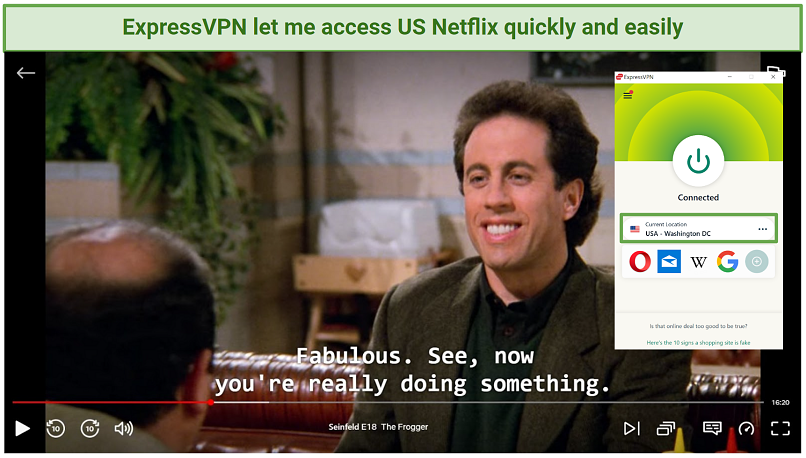 I was able to watch Seinfeld on Netflix with no lag or interruptions
I was able to watch Seinfeld on Netflix with no lag or interruptions
If streaming is your priority, then look for a VPN with the following features:
- Fast speeds — It’s normal for a VPN to reduce your speeds due to your increased encryption. But a streaming VPN should be able to produce speeds well above 25 Mbps, which is the minimum required for smooth Ultra HD streaming. Speeds of at least 5 Mbps are fast enough for HD.
- A vast network of global servers — You’ll need to use a VPN with servers in the location where the content you want to watch is available. If you need to access your Netflix US or Hulu accounts, then you need a VPN with servers in the US. If you want to access your BBC iPlayer account, then you need servers in the UK. The more servers, the better, since that leads to less congestion and better streaming speeds, too.
- Streaming device compatibility — In addition to working with laptops, tablets, and smartphones, you should go for a VPN that is compatible with media players like Apple TV, smart TVs, and Amazon FireStick. Smart DNS is a feature that makes unblocking streaming platforms on gaming consoles and smart TVs easy (since these devices don't work with VPN apps).
- Streaming optimized servers — Some VPNs make it extra easy to find servers for streaming by specifically marking and maintaining servers to access specific streaming platforms. This is especially helpful if you’re new to VPNs or don’t want to spend time searching for servers based on location.
Start Streaming With ExpressVPN
What to Look For in a VPN for Privacy and Security
A VPN with top-notch security and privacy features is crucial if you’re serious about protecting your online identity. Without adequate protection, your personal data is visible to anyone who might want access to it, including hackers and cybercriminals.
These features are also vital if you want to protect your anonymity, as unwanted third parties like your ISP can easily see what you do online and collect that data.
If privacy and security are your priority, then get a VPN with the following features:
- Military-grade encryption — This includes either AES-128 or 256-bit encryption, which are the strongest encryption standards. Both are essentially impossible to break and are used by top security agencies, but 256-bit is the strongest.
- No-logs policy — It ensures your browsing activity won’t be recorded by your VPN, further protecting your online movements. Some VPNs claim to be “no-logs”, but have been proven not to be in the past. So it’s also important to choose VPNs with no-logs policies that have been audited and verified to be trustworthy.
- Advanced protocols — These let you customize your connection, so you can increase or decrease security accordingly. Some of the safest protocols include OpenVPN, WireGuard, and IKEv2.
- Kill switch —This feature prevents the accidental exposure of your data if your VPN suddenly disconnects. In other words, it’s your final line of defense if your VPN malfunctions. It also protects your connection when you switch servers.
- DNS/IP leak protection — Your DNS requests and IP address can be accidentally revealed at any time, which is the result of a malfunction in the VPN software. But a solid VPN prevents any DNS/IP leaks with its built-in leak protections.
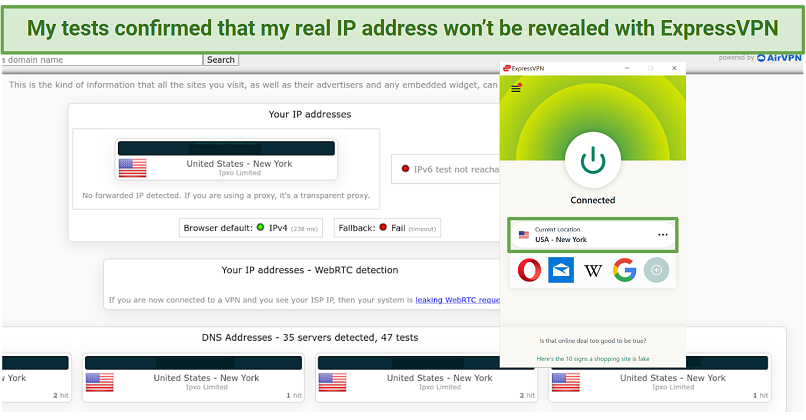 A secure VPN won’t expose your location via your IP address
A secure VPN won’t expose your location via your IP address
Stay Protected With ExpressVPN
What to Look For in a VPN for Torrenting
Torrenting is risky since you’re sharing files with plenty of strangers, who can easily identify your IP address through the P2P software you use. Therefore, you need a torrenting VPN to hide your actual IP address, so no one can trace your IP address back to you.
Keep in mind that using a VPN to hide your torrenting activity doesn’t make downloading copyrighted content legal — you shouldn’t break any laws. However, in some cases your ISP could flag you even if you’re downloading legal files. In that case, using a VPN will prevent that from happening.
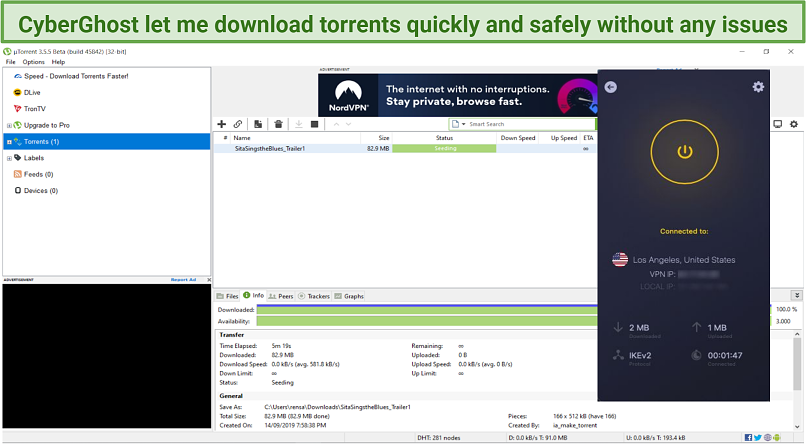 A VPN that enables torrenting will keep you safe from malicious attacks
A VPN that enables torrenting will keep you safe from malicious attacks
If torrenting is your priority, then get a VPN with the following features:
- Torrenting and P2P support — Get a VPN with dedicated P2P servers or one that enables P2P sharing on all of its servers. Either way, you should be able to torrent without any restrictions on P2P clients like uTorrent and websites like Popcorn Time.
- Robust security features — These include military-grade encryption, advanced protocols, and a kill switch, which all protect your data while torrenting.
- Reliable speeds — Fast upload and download speeds are essential for torrenting, so make sure your VPN provides unlimited bandwidth and has plenty of servers near your actual location for faster download speeds.
- No-logs policy — This ensures that your VPN provider takes your privacy seriously and won’t record your torrenting activity, either.
- Split tunneling — This is an extra feature some VPNs offer that allows you to choose which apps use the encrypted VPN connection. By connecting the VPN only to your torrent software, it can boost speeds since it won’t be encrypting every app on your device.
- Torrenting-specific extras — Some VPNs come with extra features that allow you to boost your torrenting speeds, such as port forwarding or SOCKS5 proxy access. Port forwarding allows you to connect to a larger number of seeders for better speeds, while SOCKS5 hides your IP, but uses less encryption. Neither of these are as safe as using the regular VPN connection, though.
What to Look For in a VPN for Overcoming Network Restrictions (or Censorship)
VPNs allow you to bypass restrictions set by your network, whether it's public WiFi or your school or workplace. For example, some workplaces will block social media sites and apps.
VPNs can also overcome internet restrictions in countries that highly censor online content. Keep in mind, that in countries like this (China, Russia, and the UAE are a few examples), VPNs are often illegal or heavily regulated as well. So you need to use caution and inform yourself of local laws — always choose a VPN that comes with strong security features and privacy policies.
If bypassing internet restrictions is your top priority, choose a VPN with the following features:
- Obfuscation technology — Some restrictive networks block VPN connections to prevent users from accessing the blocked content. Obfuscation (sometimes called Stealth) masks the fact you're using a VPN, making it much easier to overcome this. This feature is essential if you want access to the open internet in a country where online censorship is rampant, so make sure you choose a VPN that offers it.
- Top security features — Don't settle for anything less than 256-bit encryption and everything listed in the privacy and security section above. You should also have access to multiple secure protocols, like WireGuard, OpenVPN, and IKEv2. This is especially important if you're in a country that censors online access and regulates VPN use because sometimes entire protocols can be blocked there. A VPN that allows you to change ports (how the protocol travels) can also be helpful to overcome these limitations.
- Proven no-logs policy — This ensures that your online activities won't be recorded. Be sure to choose a VPN that's no-logs policy has been audited or proven in real-life scenarios. Any VPN can claim not to log your data, but there's no way to know for sure without these added measures.
Bypass Restrictions With ExpressVPN
3 Best VPNs for Beginners in 2023
1. ExpressVPN — The Overall Best VPN for Speed, Security, and Streaming

Tested July 2023
- Lightning-fast speeds that provide lag-free streaming
- 3,000+ reliable servers across 94 countries easily unblock streaming platforms
- AES-256 bit encryption and RAM-based servers keep your data private
- Can unblock: Netflix, Disney+, HBO Max, Hulu, Amazon Prime Video, BBC iPlayer, and more
ExpressVPN is the fastest VPN I’ve tested. In my tests, I tried 3 US servers and got an average speed of 66.32 Mbps, which is only a 9% drop from my base speed. Most VPNs reduce your speed by 10-20% — long-distance servers can even drop it by over 50%. Considering its US servers are 5,000 km away from me, a 9% drop is really impressive.
This allowed me to stream in the highest-quality and torrent large files quickly. ExpressVPN also gave me an average ping of 25ms on local servers, allowing me to play Apex Legends with little to no lag.
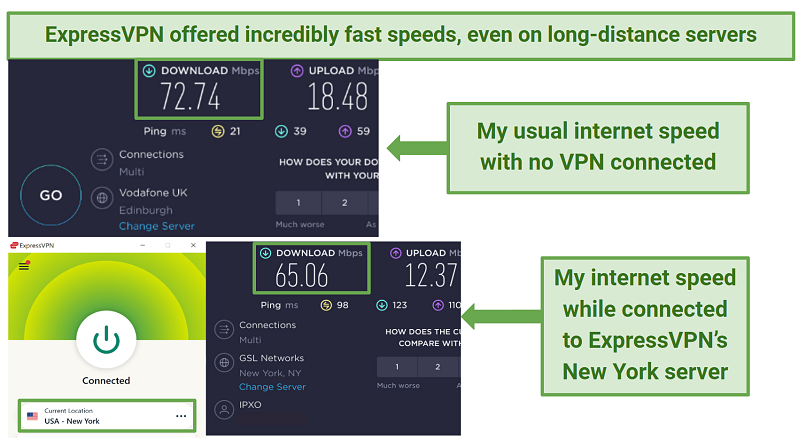 ExpressVPN reached these speeds consistently — there were no sudden slowdowns
ExpressVPN reached these speeds consistently — there were no sudden slowdowns
It’s also the most reliable VPN in this list for unblocking geo-restricted streaming platforms. I successfully unblocked every streaming platform I tried, including 7 regional Netflix libraries (including the US, UK, Canada, and Japan), Hulu, Disney+, HBO Max, BBC iPlayer, and more.
It has 3,000+ servers in 94 countries, so you’ll have full access to geoblocked content across the globe. I connected to its US server and easily unblocked HBO Max to watch House of the Dragon in UHD on HBO Max with no lag.
ExpressVPN is also easy to use. It’s compatible with all major operating systems, and it took me less than 5 minutes to sign up and install it on my Windows laptop. It also comes pre-configured for the best speeds and top security, so you don’t need to play around with the settings before using it.
For example, to access Hulu, I just had to connect to a US server (ExpressVPN will automatically select the fastest available server for you) and go to the site. Every server is also P2P-friendly — I didn’t have to find a specific server to start torrenting.
ExpressVPN also goes the extra mile to keep your personal data private. It strictly adheres to a certified no-logs policy. This is backed up by its TrustedServer technology — all of its servers are based on temporary RAM storage, which are wiped upon reboot. This means your browsing history and identifiable data are never logged. Additionally, its headquarters are in the British Virgin Islands, a privacy haven that abides by strict data protection laws.
Additionally, ExpressVPN keeps your connection highly secure. Its AES-256-bit military-grade encryption prevents third-party interceptions, while the automatic kill switch and extensive leak protection prevent your data from ever being exposed.
The only downside to ExpressVPN is that its plans are a bit pricey compared to other VPNs (plans start at $6.67/month). However, it has regular deals that provide generous savings. By signing up for the long-term plan, I got 49% off. ExpressVPN also offers short-term payment plans, but I wouldn’t recommend them as they offer less value overall.
If you aren’t sure, then you can try all of ExpressVPN’s features risk-free, as it’s backed by a 30-day money-back guarantee. I put this policy to the test by requesting a cancellation of my subscription after 27 days of service via 24/7 live chat. After telling them it wasn’t for me, they proceeded with my request without question, and I was fully refunded after 4 business days.
2. CyberGhost — Easy-to-Use Thanks to Dedicated Streaming, Gaming, and Torrenting Servers
- Optimized streaming servers for quick and easy streaming
- 9,371+ servers in 91 countries for access to tons of global content
- NoSpy servers in CyberGhost’s Romanian headquarters ensure your privacy
- Can unblock: Netflix, Disney+, HBO Max, Hulu, BBC iPlayer, Vudu, and more
CyberGhost’s optimized servers make it easy to find the ideal server for your needs. It has streaming-optimized servers for platforms like Netflix, Hulu, Disney+, and more. You can also easily find servers optimized for gaming and torrenting. This means you don’t have to spend time hopping from server to server to find the perfect one for your needs — the best ones for each activity are clearly marked and easily accessible.
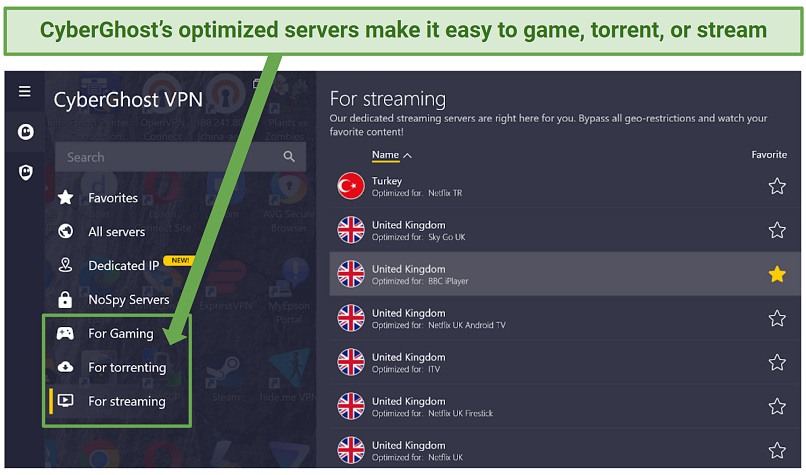 All I had to do was search for the streaming platform I wanted, and I was connected with just 1 click
All I had to do was search for the streaming platform I wanted, and I was connected with just 1 click
CyberGhost’s streaming servers are designed and maintained to reliably unblock popular streaming services. When I tested its servers for Hulu and Netflix UK, I was able to consistently access them without issue every time. I watched multiple episodes of Stranger Things on Netflix, and the connection never dropped once. I could watch my favorite geo-restricted content without any fuss.
Its speeds are more than enough for streaming, torrenting, and gaming. When I tested its streaming-optimized servers for Netflix France and BBC iPlayer, my speeds never dropped below 52.81 Mbps — a 27% drop. It’s not as fast as ExpressVPN, but I could still stream in UHD. Plus, with its gaming-optimized servers, I got an average ping rate of 29 ms, so I could play Apex Legends without lag.
When it comes to security, CyberGhost conceals your personal information with military-grade AES 256-bit encryption. This makes your data unreadable, and it's essentially impossible to decode. In addition, it has a kill switch as well as IP/DNS and WebRTC leak protection to ensure your IP address won’t be exposed.
CyberGhost also keeps your data private. Your online behavior and personal information are never stored because of its strict, independently audited no-logs policy. If privacy is a major concern, it also offers NoSpy servers, which are privately hosted by CyberGhost in their Romanian headquarters. Only CyberGhost staff have access to these VPN servers — you won’t have to worry about any third party compromising your VPN server and intercepting your data.
One downside is that its short-term plans are expensive and come with a shortened money-back guarantee (14 days vs. 45 days). However, the long-term plans are really affordable — you can get a subscription for just $2.19/month.
CyberGhost’s money-back guarantee lets you get your money back in full if you're not satisfied. To test this policy, I tried to cancel my account after 42 days of use by contacting CyberGhost support via 24/7 live chat. The agent asked me a couple of questions about my experience before they processed the return, and I got my money back after 4 days.
3. Private Internet Access — Thousands of Servers Offer a Fast & Reliable Connection Around the World
- 29,650+ servers in 84 countries for huge accessibility and solid connections
- Fast speeds for seamless streaming and torrenting
- Unlimited simultaneous device connections
- Can unblock: Netflix, Disney+, HBO Max, Hulu, BBC iPlayer, Vudu, and more
Private Internet Access (PIA) has a massive server network, with 29,650+ servers in 84 countries. Since you get faster speeds the closer you are to a server, you can always connect to a low-latency server wherever you are. Having more servers also reduces the chances of overcrowding, which can slow down your speeds. This makes it easy to find a reliable connection for streaming, gaming, or torrenting.
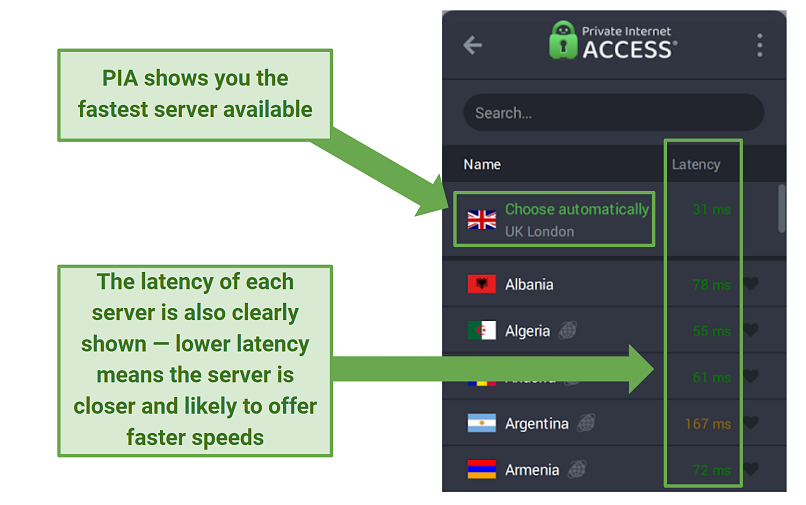 PIA’s app is user-friendly — it took me less than a minute to connect to a fast server
PIA’s app is user-friendly — it took me less than a minute to connect to a fast server
PIA’s Next Generation Network is built for speed, so you get fast and reliable connections. When I tested 4 US servers, I got an average download speed of 47.7 Mbps while watching Netflix. This was only a 34% drop from my usual speed, despite PIA’s US servers being thousands of kilometers away from my location. I also used its nearby UK server to get a 720MB torrent file in less than 5 minutes.
PIA boasts robust security and privacy capabilities. You have the option to select between AES 128-bit and 256-bit encryption, with the former providing faster performance at the expense of lower strength. Additionally, PIA provides protection against IP and DNS leaks, as well as an automatic kill switch, ensuring your personal data remains concealed.
Unlike ExpressVPN and CyberGhost, PIA is headquartered in a 5-Eyes Alliance country — the US. The 5-Eyes Alliance is an international government surveillance network that could potentially compel PIA to overturn user data. However, PIA’s no-logs policy has been proven in 2 court cases. Even when the government asked for data, PIA couldn’t comply since there was none to give.
I found that its $2.03/month long-term plan is the best deal. There’s also a short-term plan with the same features, but the long-term plan saves you more money. It also comes with a free 1-year subscription to Boxcryptor, a service that lets you encrypt your cloud data on Google Drive, iCloud, and Dropbox.
It’s also backed by a 30-day money-back guarantee, so you can test PIA completely risk-free. I asked them over 24/7 chat to cancel my account after trying PIA for 3 weeks. After I gave my reason for canceling, I was refunded after 4 business days.
How to Get a VPN on Your Devices
Downloading and installing a VPN is a straightforward process that usually takes under 3 minutes. In most cases, you just need to create an account, download the app, and connect to a server. But it can get a bit trickier for devices that don’t support native apps, such as home routers, gaming consoles, or streaming devices.
Regardless of your device, the VPN I recommend is ExpressVPN because it has vast compatibility. It works with tons of devices and operating systems (and it’s easy to use on all of them). Plus, it has a special MediaStreamer feature that provides a simple setup for devices that don’t support VPN apps, like gaming consoles and smart TVs.
The subsequent instructions demonstrate the process of installing a VPN on different devices. Although ExpressVPN is used as an example here, the steps are typically the same no matter which VPN you choose to install.
How to Get a VPN on Desktops and Laptops (Windows & macOS)
- Choose a VPN. All of the VPNs I’ve listed above are great options for any online activity, but make sure to choose one that suits your needs.
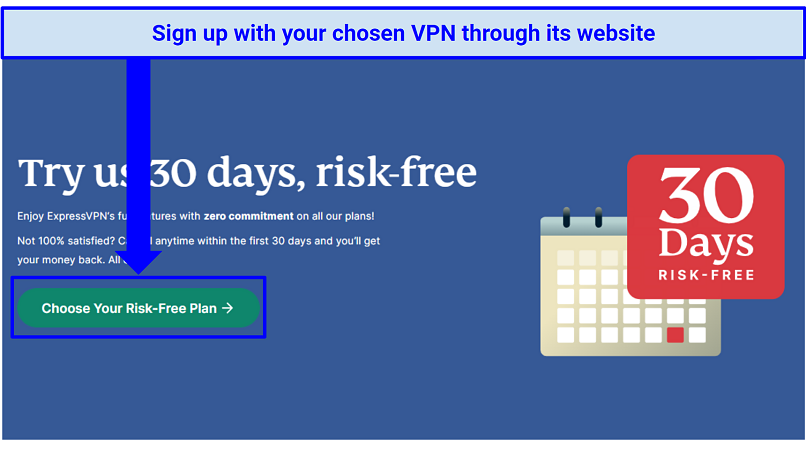 I recommend ExpressVPN — it has the fastest and most reliable servers and an easy sign-up process
I recommend ExpressVPN — it has the fastest and most reliable servers and an easy sign-up process - Sign up for a subscription. Head to the VPN's website and sign up.
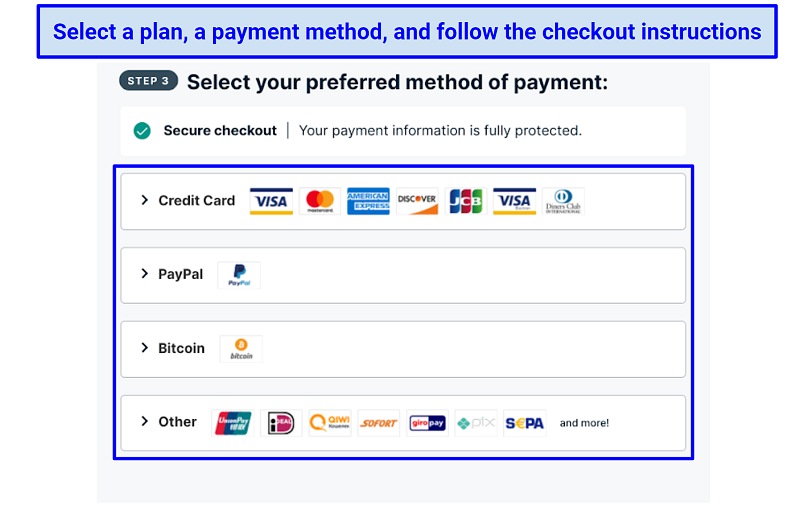 ExpressVPN also lets you pay with cryptocurrency so that you can pay anonymously
ExpressVPN also lets you pay with cryptocurrency so that you can pay anonymously - Download the app. Make sure you choose the correct operating system (Windows, Mac, Linux).
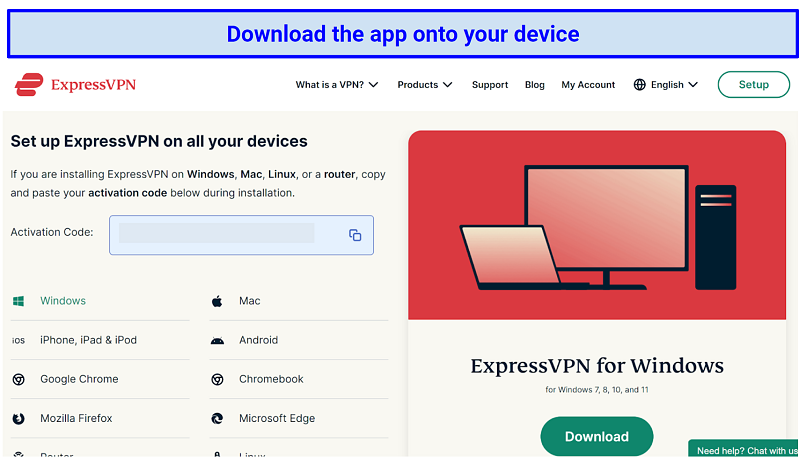 Good VPNs will be compatible with most popular devices
Good VPNs will be compatible with most popular devices - Follow the installation prompts. You’ll need to log in with the same credentials you used when you signed up. Some of the common things that many VPNs will ask are if you’d like it to launch on startup and share crash reports. Select your preferences, and installation should complete.
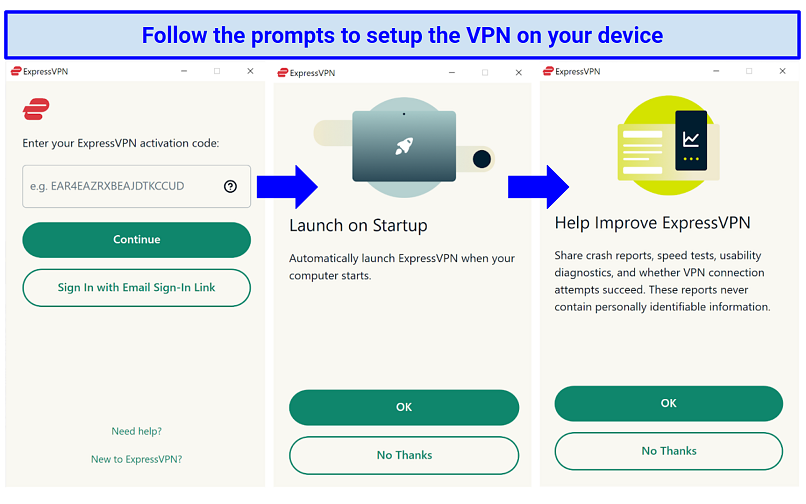 You might need to use an activation code, which you can usually find by logging in to the VPN website
You might need to use an activation code, which you can usually find by logging in to the VPN website - Start using your VPN. Load the app and connect to a server to protect your privacy, stream geo-blocked content, and torrent safely.
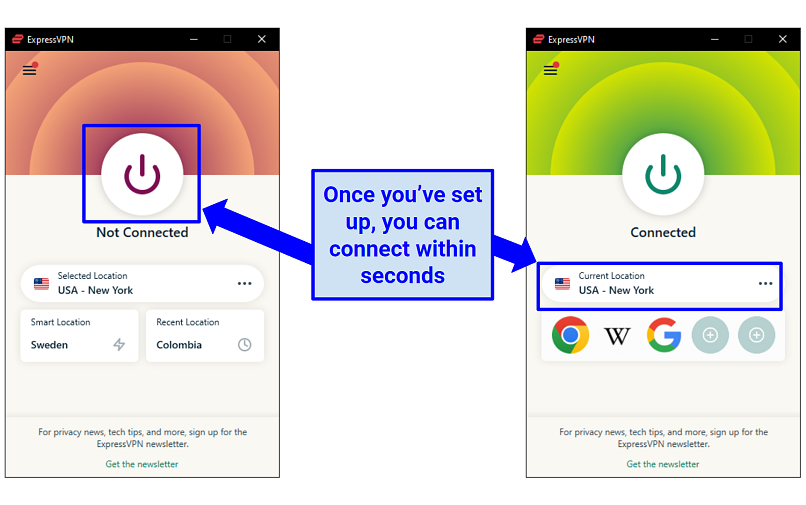 VPNs like ExpressVPN have a Smart Location feature that will automatically connect you to the fastest server
VPNs like ExpressVPN have a Smart Location feature that will automatically connect you to the fastest server
You can also install our top VPNs on various Linux distributions. In most cases, you’ll need to use the command-line to install and run the VPN. However, PIA offers a graphical user interface for Linux, supporting popular distributions such as Ubuntu, Debian, Fedora, and more. You can install and use the VPN without ever touching the command-line, making it the easiest option for Linux.
How to Get a VPN on Smartphones (Android and iOS)
- Choose a VPN. I’d recommend one that comes with a lightweight app and security features to preserve battery life. ExpressVPN’s Lightway protocol was designed with phones in mind, so it’s a top choice.
- Sign up for a subscription. It’s best to do this directly through the VPN website. Signing up through the Google Play or Apple App stores can disqualify you from the money-back guarantee (you have to then abide by Google/Apple’s refund policy).
- Go to the App Store. Search for the VPN’s name in your App Store on your phone and download the app.
- Install the VPN. This usually happens automatically, but you might have to tap a couple prompts allowing the VPN to alter your network settings.
- Use your VPN. Open the app, log in with the credentials you got during sign up, and connect to a server to protect your iPhone or Android device.
How to Get a VPN on Your Home Router
When you set up a VPN on your home router, all the devices linked to that network will be connected to the VPN. Interestingly, this includes devices that do not have a VPN installed, such as smart TVs, streaming devices, and gaming consoles like PlayStation and Xbox.
If you plan to do this, make sure your router is VPN-compatible (most ASUS, Linksys, and Netgear models are, but there are others that work, too). Each VPN and router combination will have different installation instructions, but you can usually find them in detail on your VPN provider’s website.
Here’s a general guide:
- Get a VPN and a VPN-compatible router. If you’re certain you want to install a VPN on your router, choose a VPN that has a native app for them. It makes it much easier to navigate and configure the VPN once it’s set up.
- Download the VPN’s router firmware. This will usually be available in the dashboard of your VPN account page. Each VPN will have detailed guides that show you how to download and install the firmware.
- Install the firmware. Make sure your router is connected to the internet, then open the router configuration page by typing “192.168.1.1” into your browser’s search bar. There should be an option to “Upgrade Firmware”. Just upload the firmware you downloaded, follow the prompts, and you’re set.
Most VPNs also offer routers with the VPN software already installed, so if you want to skip the setup (and have some extra cash), you can just purchase one. In addition, some VPNs are easier to use on routers than others. ExpressVPN has a native app for routers that makes it easy to change servers and settings. Many other VPNs require manual setup and server switching (and don’t offer as many features as their VPN apps).
How to Set Up a VPN and Use It
Once you’ve installed a VPN on your device, there’s not much to do other than find a server and connect to it. But some servers will be better than others depending on your needs, so knowing how to find the right one is important.
You can also customize your security settings to enhance your experience, but this isn’t usually necessary. Most VPNs come with pre-configured settings that secure your connection automatically.
How to Choose the Right VPN Server
Not all servers are equal, as some are better suited for certain activities than others. Here are a few examples to help you choose the best VPN server depending on your online activity:
- For security and privacy: Any server will provide you with the same level of privacy and security protection. So, the best option is to choose a VPN server closest to your location to maximize speed and performance.
- For streaming: If you’re trying to unblock a streaming site, then you’ll need to connect to a server that’s in a licensed country of your site. For example, a US server is required for US Netflix. Some VPNs have streaming-optimized servers like CyberGhost, so you should use them if possible. It’s also best to connect to a nearby server if you can, as close distances produce faster speeds for better streams.
- For torrenting: Make sure you choose a P2P-enabled server to be able to download torrents. Another option is to use a P2P-optimized server, which is specifically used for torrenting only. Like streaming, you should choose a nearby server to get the fastest download speeds. Or, if you’re concerned about privacy, then connect to a server in a privacy-friendly nation like Switzerland.
- For bypassing firewalls: Select an obfuscation server, which uses a special algorithm to bypass firewalls and restrictions. This algorithm jumbles your data to hide your VPN use, so even the fact you’re using a VPN is hidden. These servers are often labeled as “stealth” servers and usually need to be toggled on under the VPN’s security settings.
How to Configure VPN Settings
There’s usually no need to significantly change your VPN settings since they’re already pre-configured in most cases. But if you want to customize and enhance your connection, then it’s worth considering. Here are a few common settings that most VPNs have and some tips on configuring them:
- Kill switch — A last line of defense that disconnects you from the internet if your VPN isn’t connected, preventing accidental leaks. It’s especially handy when changing networks or using public WiFi. It’s usually on by default, but some VPNs do require you to activate it manually through the VPN settings.
- Encryption — The best VPNs offer AES-256-bit encryption, which is the highest level available and is used by the military and government agencies. This ensures your data remains 100% safe and secure. Some VPNs, like PIA, let you adjust your encryption level, letting you optimize for speed or security.
- Protocols — VPN protocols refer to a set of processes that generate a secure path between your device and the VPN server. Some VPNs have several protocols to choose from, like OpenVPN and WireGuard, which differ in speed and security. You can easily switch between protocols in the VPN settings. A VPN’s default protocol usually offers a good balance of speed and security, so you shouldn’t need to change anything.
- Split tunneling — A feature that lets you choose what traffic goes through your VPN and what doesn’t. For example, you can use the VPN to browse region-locked content while gaming on your faster, low-latency local connection. In the VPN settings menu, just select the apps you want to use with the VPN connection and which ones you want to be excluded.
- Ad/tracking blockers — These settings prevent you from being bombarded with annoying ads and stops advertisers from being able to track you. It can even improve your browser’s performance since it’s not being slowed down by pop-ups. Not all VPNs offer this service, but if they do, it’s usually toggled on by default.
- Auto-connect — Most VPNs have an auto-connect feature you can enable through its settings. This ensures you automatically connect to the VPN when you start up your device. Some VPNs also allow you to set your VPN to auto-connect when you’re on untrusted networks, like unrecognized public WiFi.
- Multi-hop — A multi-hop connection, also called a double-VPN connection, is when your traffic is encrypted more than once and sent through 2 or more VPN servers. This feature is only offered by a few VPNs, but it makes your data even more secure. However, this feature usually slows your speeds dramatically. Unless you need maximum privacy protection, you don’t need to enable this feature.
If you ever need help changing your settings, you can look at your VPN's help section or just ask them directly. Many VPNs offer helpful 24/7 live chat and have step-by-step guides and tutorials on their websites that show you how to change your settings.
FAQs on VPNs
Are VPNs really necessary? Is a VPN worth it?
If you’re at all concerned about your online security and privacy, then VPNs are definitely worth it. Since a VPN encrypts your connection and hides your IP address, it protects sensitive data and stops third parties from tracking your online activity. This alone has many huge benefits — you’re protected from cybercriminals and government surveillance, allowing you to freely and securely browse the internet. Additionally, it can bypass geoblocks by rerouting your traffic through a private server in another country, which also masks your actual location.
VPNs are also very affordable. You can get a great VPN for around $6/per month or less and you can save a lot when you take advantage of discounts and sign up long-term. For example, ExpressVPN is offering 49% off right now. With such massive benefits to your online privacy for such a low price, it's hard to say that a VPN isn’t worth it.
What devices can I use a VPN on?
VPNs are compatible with most WiFi-enabled devices, including:
| Mac | Windows | Mobile (iOS, Android) | Certain routers |
| Linux | Smart TVs | Roku | Amazon Fire Stick |
| Game consoles (Xbox, PlayStation) | Apple TV | Kodi | Browsers (Chrome, Edge, Firefox, Opera) |
If your device can run VPN apps, such as a PC or smartphone, then you can just install the app directly. These apps are beginner-friendly and do not require any technical knowledge to use. They only take a few minutes to install, and you can connect to a VPN server with just one click.
If your device doesn’t support VPN apps (such as a game console or smart TV), you can install it on your home router. Routers protect all WiFi-enabled devices connected to them. However, not all routers support VPNs, and even if yours does, it can be tricky to install the necessary VPN firmware.
Alternatively, you can set your PC up as a VPN hotspot, which will also protect all devices connected to it. This is easier to set up, but requires your devices to be near your PC for a reliable connection..
Many VPNs also offer VPN browser extensions to boost your online privacy. They hide your IP address so you can browse privately. The best VPN browser extensions connect to streaming services and offer servers in a number of locations. However, many VPN browser extensions offer less security features than the VPN app. In addition, it will not protect all traffic from your device — just your browser traffic.
Does a VPN keep you anonymous online?
The simple answer is no. A VPN can give you privacy, but not total anonymity. A VPN hides your location and IP address and assigns you a new one from a server in a different location. It also protects you from cybercriminals and government/ISP surveillance, thanks to its military-grade encryption. But the VPN company would still have access to your real IP address and information about your online activity — this is unavoidable and required for the servers to work.
This is why it’s crucial to choose a VPN with a strict no-logs policy, so it won’t have any data to share if it’s compelled to by a government agency. But even this isn’t enough if true anonymity is the goal. There’s always a risk that your personal information could be intercepted if the VPN server itself is compromised, by hackers, government agencies, or third-party data center employees. Plus, your VPN will also require an email address and payment information in order to create your account, take payments, or refund you.
However, there are some ways to protect your anonymity while using a VPN. For example, you can pay for your VPN with a cryptocurrency like Bitcoin, so that you don’t need to give your VPN company payment information and other sensitive data.
You could also use a multi-hop connection, which protects your personal information from being intercepted even if one of the VPNs in the chain has been compromised. This is thanks to the additional layers of encryption and IP masking, giving the interceptor nothing to work with.
Does a VPN bypass blocked websites?
Yes, you can get a VPN to access blocked websites from anywhere. Whether the site is unavailable because of a firewall, network restrictions, or geo-restrictions, a reliable VPN will be able to bypass the block allowing access. In all cases, the VPN’s ability to encrypt your traffic and mask your IP is what does the trick. Some VPNs even offer special stealth (obfuscation) features that are designed specifically to bypass even the toughest firewalls and network restrictions.
One of the most popular reasons to use a VPN is to access different streaming content on Netflix, for example. Since the shows and movies available differ by region, a VPN can change your virtual location and open up content normally not available to you. In addition, it works to access streaming platforms (and websites) only available in certain countries. Hulu is only available in the US, but connecting your VPN to a server in the US can give you access to it even if you’re not currently located there.
Should I get a VPN for free or pay for one?
While a free VPN might seem like a good idea, they can be unsafe and come with limitations paid VPNs don’t have. Unlike a free VPN, paid VPNs don’t impose restrictions like data caps or speed limits. In addition, free VPNs often have a smaller server network with slow speeds due to congestion. Plus, they usually lack the advanced security features paid VPNs have.
Paid VPNs are usually really affordable and come with money-back guarantees so you can easily get a full refund (usually within 30 days of purchase). For a few dollars a month, you get fast speeds, robust security and privacy features, and vast server networks that no free VPN offers.
Is using a VPN legal?
VPNs are legal in most countries, but there are exceptions. Countries with strict censorship laws like China, Russia, and Iran have outlawed or restricted VPNs. They usually only allow the use of government-approved VPNs, which don’t protect your privacy since you can still be tracked using them.
If you’re traveling to one of these countries, then it’s best to download a reliable VPN before setting foot in your destination. Places like China ban VPN websites so it’s not possible to get a VPN while you’re there. If you plan to use a VPN in a country with a lot of internet censorship, I advise that you look into the most up-to-date local laws first so you don’t accidentally break them.
Should I get a VPN router?
You should get a VPN router because it’s the best way to protect all the devices on your home network. This means there’s no need to install a VPN on each device and connect separately. You can either install a VPN on your existing router (if it’s compatible), or buy a router with the VPN pre-installed on it.
VPN routers are especially handy if you use devices that can’t run VPN apps, like gaming consoles and smart TVs. However, a certain amount of configuration is required when installing a VPN on your router. Each router and VPN will have different setup methods, but the VPN provider will usually have instructions for this on its website, which makes the process a lot easier.
If you want to change servers, then you’ll usually need to manually change servers in the router firmware. Or, some VPNs (like ExpressVPN) have native apps that let you change servers more easily.
Does a VPN slow down your internet?
Normally, yes. You can usually expect a 10–20% drop in speeds with a VPN. If you connect to a location really far away, then speeds will drop even more (but shouldn’t be more than 50%). Basically, the farther your data has to travel, the slower your speeds tend to be.
However, the best VPNs won't slow down your connection too much due to their premium features. Good VPNs use the best hardware for their servers. They also use optimized VPN protocols that are designed to give you fast speeds without cutting corners on security. For example, the WireGuard protocol is available with most quality VPNs and it provides faster speeds than most alternatives, while remaining highly secure.
A VPN will almost always impact your speed in some way. This is because your data has to go through the VPN server instead of going straight to its online destination. Also, the VPN encrypts and decrypts your data to keep it secure, which takes even more time.
Can I use a VPN with Tor?
Yes, you can use a VPN with Tor and it’s easy. All you need to do is connect to your VPN, open the Tor browser, and start using it normally (this is sometimes referred to as "Tor Over VPN"). The benefit of combining the 2 is the increased privacy because it prevents the first Tor server (the entry node) from seeing your actual IP address. But keep in mind that using a VPN with Tor is usually slower than using Tor without a VPN. This is because a VPN adds more encryption, which slows speeds.
Is a VPN different from a proxy server?
VPNs are different from proxy servers because they use military-grade encryption and proxy servers generally don’t. Both of them can be used to bypass geoblocks since your IP address is changed, but only a VPN will encrypt your data and protect you under a no-logs policy. This means no one can see what you do online, including your ISP. In contrast, a proxy server will hide your actual IP address but won’t provide strong encryption. Proxies tend to only work in your internet browser as well, whereas a VPN protects every app on your device that uses the internet.
Protect Your Online Privacy Today
As the internet becomes more prevalent in our lives, the need for proper security and privacy measures continues to grow. A VPN is one of the most reliable and cost-effective ways to protect your personal data and privacy while online. It can also access blocked websites, prevent bandwidth throttling, and keep you safe when torrenting.
Of the 150 VPNs my team and I regularly test, ExpressVPN is the top choice whether you’re new to VPNs or not. It's user-friendly, superfast, and one of the most reliable VPNs I’ve tested. And thanks to its 30-day money-back guarantee, you can try ExpressVPN without any risk. If it’s not for you, then you can get a full refund.
To summarize, the 3 best VPNs for beginners are…
Your data is exposed to the websites you visit!
Your IP Address:
Your Location:
Your Internet Provider:
The information above can be used to track you, target you for ads, and monitor what you do online.
VPNs can help you hide this information from websites so that you are protected at all times. We recommend ExpressVPN — the #1 VPN out of over 350 providers we've tested. It has military-grade encryption and privacy features that will ensure your digital security, plus — it's currently offering 49% off.



